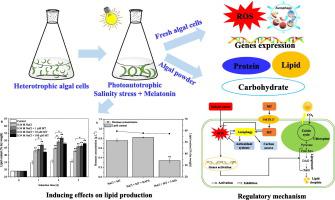Algal Research ( IF 5.1 ) Pub Date : 2021-01-14 , DOI: 10.1016/j.algal.2021.102196 Yongteng Zhao , Xueting Song , Peng Zhao , Tao Li , Jun-Wei Xu , Xuya Yu

|
The aim of this study was to explore the effect of melatonin (MT) on lipid accumulation in Monoraphidium sp. QLY-1 under salinity stress. The interconnection between MT, oxidative stress and autophagy in the regulation of lipid synthesis was also clarified. MT application significantly promoted the lipid content, peaking at 51.74%, which was 1.16- and 1.44-fold higher than those induced by salinity stress alone (44.77%) and control group (35.96%), respectively. Exogenous MT also upregulated the transcription levels of lipogenesis-related genes and decreased salinity stress-induced oxidative stress. Interestingly, the application of MT upregulated autophagic activity, which led to the 1.47-fold upregulation of autophagy-related atg8 gene expression. Additional results demonstrated that autophagy promotion led to further increases in lipid accumulation by involving lipogenesis gene expression and ROS signalling in cells treated with MT under salinity stress conditions. The maximum lipid content (54.26%) was achieved by treatment with MT and rapamycin (RAPA), an activator of autophagy. Taken together, these findings indicate that combination of MT and salinity stress is a valuable strategy for enhancing lipid production in microalgae and provides novel insights into the regulatory mechanisms underlying the effects of MT and autophagy on the promotion of lipid synthesis and improvements to algal tolerance.
中文翻译:

褪黑素在调节微藻单生单胞菌中脂质积累,自噬和盐度诱导的氧化应激中的作用。QLY-1
这项研究的目的是探讨褪黑激素(MT)对Monoraphidium sp中脂质积累的影响。在盐胁迫下的QLY-1。还阐明了MT,氧化应激和自噬之间在脂质合成调节中的相互关系。施用MT显着促进了脂质含量,最高达到51.74%,分别比单独盐分胁迫(44.77%)和对照组(35.96%)诱导的脂质含量高1.16倍和1.44倍。外源MT还上调了与脂肪生成相关的基因的转录水平,并降低了盐度胁迫诱导的氧化胁迫。有趣的是,MT的应用上调了自噬活性,导致自噬相关的atg8上调了1.47倍基因表达。额外的结果表明,自噬促进通过在盐胁迫条件下用MT处理的细胞中涉及脂肪生成基因表达和ROS信号传导,从而进一步增加脂质蓄积。通过使用MT和雷帕霉素(RAPA)(一种自噬激活剂)进行治疗,可以达到最大脂质含量(54.26%)。综上所述,这些发现表明MT和盐度胁迫的结合是增强微藻类脂质生产的一种有价值的策略,并且为MT和自噬对脂质合成的促进和对藻类耐受性的改善的潜在调节机制提供了新的见解。


























 京公网安备 11010802027423号
京公网安备 11010802027423号